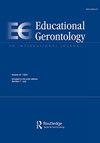Process evaluation of a complex group-based intervention for older adults living alone
IF 1.5
4区 教育学
Q3 EDUCATION & EDUCATIONAL RESEARCH
引用次数: 0
Abstract
A complex intervention called ‘participatory group-based care management’ was developed and carried out in Central and Eastern Finland to promote older adults’ wellbeing and quality of life. This study analyses the process of the intervention using two types of qualitative data. Firstly, during the six-month intervention, 120 reflection diaries in total were written by researchers and care managers, based on their observations of the group meetings. Secondly, 24 focus group discussions were carried out with the intervention participants. Both data were analyzed jointly by using the grounded theory method to evaluate the intervention process. Based on the data, three important elements of the intervention were social support exchange, needs-based counseling, and scheduled group meetings. These elements support older people in terms of social wellbeing, resources and capacity, experiences of meaningfulness, participation and routines, and empowerment. Contextual and intervening factors related to the intervention, group tutors, and participants, are essential for achieving outcomes. The three important elements of the intervention (social support exchange, needs-based counseling, and scheduled group meetings) appear to empower some older adults and engage some of them in activities. According to the results, the effectiveness of the intervention is based on socially and individually constructed causal pathways, but the intervention should be refined before its further implementation.对独居老年人复杂群体干预的过程评价
芬兰中部和东部开发并实施了一项名为“参与式基于群体的护理管理”的复杂干预措施,以促进老年人的福祉和生活质量。本研究使用两类定性数据分析干预过程。首先,在六个月的干预期间,研究人员和护理经理根据他们对小组会议的观察,总共写了120篇反思日记。其次,与干预参与者进行24次焦点小组讨论。采用扎根理论方法对两种数据进行联合分析,评价干预过程。根据数据,干预的三个重要要素是社会支持交换、基于需求的咨询和预定的小组会议。这些要素在社会福利、资源和能力、有意义的体验、参与和日常活动以及赋权方面为老年人提供支持。与干预、小组导师和参与者相关的背景和干预因素对于取得结果至关重要。干预的三个重要要素(社会支持交换、基于需求的咨询和定期小组会议)似乎赋予了一些老年人权力,并使他们中的一些人参与到活动中来。结果表明,干预的有效性基于社会和个体构建的因果路径,但在进一步实施干预之前,还需要对干预进行完善。
本文章由计算机程序翻译,如有差异,请以英文原文为准。
求助全文
约1分钟内获得全文
求助全文
来源期刊

Educational Gerontology
Multiple-
CiteScore
2.50
自引率
13.30%
发文量
80
期刊介绍:
This well-respected journal offers up-to-date original research in the fields of gerontology, adult education, and the social and behavioral sciences. Researchers from around the world will benefit from the exchange of ideas for both the study and practice of educational gerontology. Papers published in the journal will also serve as authoritative contributions to the growing literature in this burgeoning field. Educational Gerontology is the only international journal of its kind to publish twelve issues per volume year. Articles featuring outcome-based practical educational resources in gerontology for the educational professional, care provider, trainer, and student in such areas as: art, music, drama and recreational therapies; mental health, communication arts, social programs and policies; and, social work, nursing, physical and occupational therapies, financial planners, architecture and interior design, family relations and therapy, and religion and spirituality.
 求助内容:
求助内容: 应助结果提醒方式:
应助结果提醒方式:


